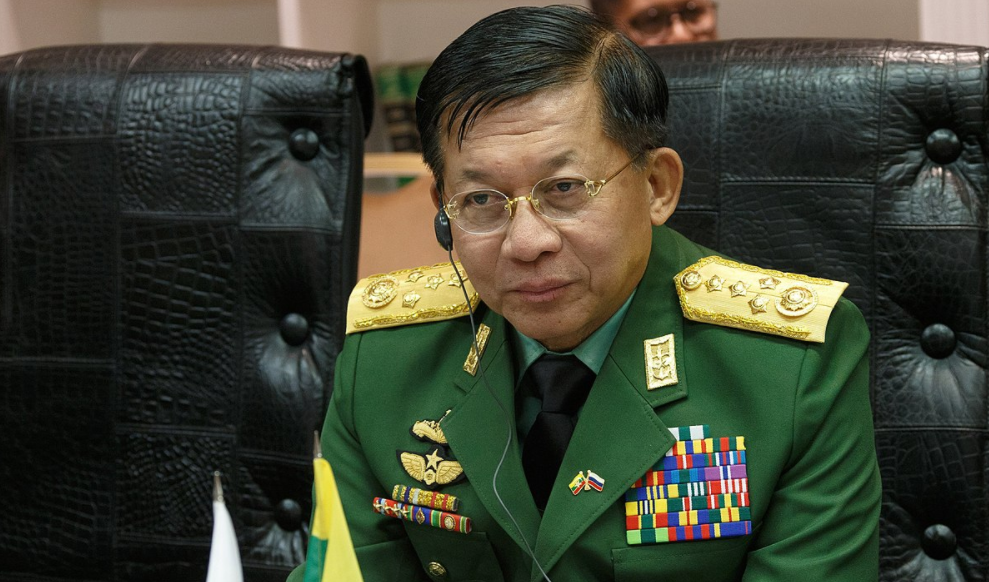ICC Prosecutor Seeks Arrest Warrant for Myanmar Commander Min Aung Hlaing: UN Expert
Following meetings in The Hague with ICC Prosecutor Karim A.A. Khan and his team, Andrews emphasized the importance of building on this momentum to deliver justice and accountability for the victims.

The International Criminal Court’s (ICC) decision to pursue an arrest warrant for Myanmar’s military commander-in-chief Min Aung Hlaing has been hailed as a significant milestone in the pursuit of justice for atrocities committed against the Rohingya people, according to UN Special Rapporteur Tom Andrews.
Following meetings in The Hague with ICC Prosecutor Karim A.A. Khan and his team, Andrews emphasized the importance of building on this momentum to deliver justice and accountability for the victims.
“The Prosecutor’s decision to request an arrest warrant for Min Aung Hlaing in relation to his crimes against the Rohingya was a long-awaited and critical step forward,” Andrews said. “There is not a moment to lose to move the wheels of justice forward.”
This comes in response to the 2017 attacks against the Rohingya minority, during which Myanmar’s military launched brutal campaigns of violence, deportation, and persecution, forcing over 700,000 Rohingya to flee to neighbouring Bangladesh. The crimes fall under the jurisdiction of the ICC because they occurred, in part, within Bangladesh, a State Party to the Rome Statute. Myanmar itself is not a State Party to the ICC, and the UN Security Council has yet to refer the situation to the Court.
Limited Jurisdiction, Broader Implications
While acknowledging the ICC's progress, Andrews pointed out the jurisdictional limitations, which restrict the Court's focus to specific crimes related to the Rohingya. “Unfortunately, the Prosecutor’s case does not address the full breadth of atrocities committed against the Rohingya, the ongoing crimes since the 2021 military coup, or historic abuses against pro-democracy activists and ethnic minorities,” Andrews said.
The 2021 coup, which saw the military overthrow Myanmar's democratically elected government, has since been marked by widespread human rights violations, including war crimes and crimes against humanity perpetrated by the junta under Min Aung Hlaing’s leadership.
Call for Global Action and Accountability
Andrews urged governments to act decisively:
Support universal jurisdiction cases in national courts to hold perpetrators accountable.
Utilize Article 14 of the Rome Statute to allow ICC intervention beyond its current jurisdiction.
Reconsider diplomatic and economic relationships with Myanmar’s junta, particularly in light of the ICC Prosecutor's application for an arrest warrant.
“All States that continue to engage with the junta should be re-evaluating their relationship with the Senior General in light of the Prosecutor’s application for an arrest warrant,” Andrews said, underscoring the need for international pressure.
Hope for Rohingya Victims
For the Rohingya community, this decision marks a long-awaited sign of progress. “This is an important moment for victims of the 2017 attacks, who have waited for justice for far too long,” Andrews said.
He stressed that Min Aung Hlaing must also be held accountable for ongoing atrocities across Myanmar, saying: “Min Aung Hlaing is not only accused of atrocity crimes against the Rohingya, but he is also responsible for ongoing war crimes and crimes against humanity throughout Myanmar. He must be stopped and held accountable.”
The Path Ahead
On November 27, ICC Prosecutor Karim Khan announced in Bangladesh that an application for an arrest warrant had been filed against Min Aung Hlaing for crimes against humanity, specifically deportation and persecution. Khan reaffirmed his commitment to pursuing additional warrants, signaling a broader effort to hold Myanmar’s military leadership accountable.
Andrews concluded by calling on the international community to act swiftly, ensuring that this momentum translates into tangible accountability.
“Min Aung Hlaing and his brutal junta can’t hide from justice,” Andrews said. “The ICC’s recent decision is an important step forward, but much more needs to be done to ensure robust accountability for the staggering catalogue of crimes committed in Myanmar.”
Key Points at a Glance:
ICC Prosecutor Karim Khan has applied for an arrest warrant for Min Aung Hlaing over 2017 crimes against the Rohingya.
The crimes occurred partly in Bangladesh, giving the ICC jurisdiction under the Rome Statute.
UN Rapporteur Tom Andrews hailed the move but called for greater global efforts to hold Myanmar’s junta accountable.
The call includes supporting universal jurisdiction, re-evaluating state relationships with the junta, and expanding ICC action.
The ICC’s application provides a renewed sense of hope for victims while underlining the need for a unified international response to end Myanmar’s ongoing cycle of violence and impunity.
- READ MORE ON:
- Min Aung Hlaing
- Rohingya
- Tom Andrews
- International Criminal Court










